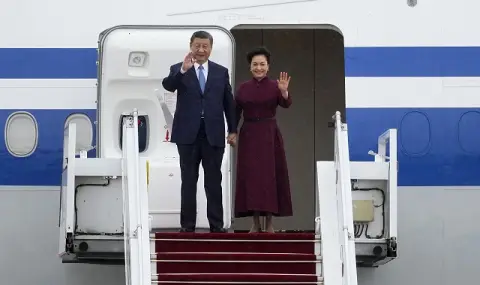Chinese President Xi Jinping began his first tour on Sunday in Europe for five years, arriving in Paris. Xi is expected to leave France for the Serbian capital Belgrade today. The third European country the Chinese leader is scheduled to visit this week is Hungary.
The American New York Times, citing experts, noted that all three countries Xi will visit to one degree or another support China's quest to reshape the world order. All three countries are questioning the balance of power on the international stage after the Second World War, established under the dictates of the United States, and want to strengthen their ties with Beijing, writes the journalist from the "New York Times" Emma Bubola.
Bubola argues that Xi sees his visit to Europe as a "strategic opportunity to weaken the continent's ties with the US and create a world free of American influence”. The journalist points out that at a time of tension between China and most European countries, due to Beijing's close relations with Moscow and espionage scandals, Xi is trying to achieve a “pragmatic rapprochement” with Europe.
Regarding yesterday's talks in Paris between Xi, Emmanuel Macron and European Commission President Ursula von der Leyen, another author - Roger Cohen, wrote in the “New York Times” that Xi resolutely opposed criticism directed at Beijing because of its support for Russia in its war against Ukraine.
Xi has "strongly resisted criticism", saying Beijing is opposed to "the crisis being used to shift responsibility to a third country, tarnish its image and instigate a new cold war", notes the daily.
"The New York Times” also pays attention to Xi's words that "his country is not the source of the crisis and is neither a party to it nor a participant".
Bubola highlighted the fact that Xi timed his arrival in Belgrade today to coincide with the 25th anniversary of the NATO bombing of the Chinese embassy in the Serbian capital on May 7, 1999, during the Kosovo war. This mistaken strike, which caused the death of three Chinese journalists, for which the White House apologized, became the cause of angry protests, the journalist recalls.
"For Xi, the visit to Belgrade is quite an advantageous way to ask the question whether the US is really serious about international law," he told the "New York Times" the director of the Asian program of the European Council for International Relations in Berlin Janka Jortel.
According to the "Washington Post" on the first day of his visit to Europe, he faced a "continent of skeptics". The American daily launched the thesis that with his visit to Europe, the Chinese leader aims to open up China.
"Washington Post" notes that European countries are divided on how China should be perceived - as a "partner for cooperation" or (which is Washington's position) "more like a potential dangerous rival".
According to the "Wall Street Journal" Xi had no reason to hope for an "light tour" of Europe. The American publication noted that analysts had predicted that Emmanuel Macron would use the occasion to criticize China's support for Russia in the conflict with Ukraine.
At the same time, however, the daily points out, European leaders do not want to be too tough on China, as they cannot risk their ties with a solid trading partner.
The British "Guardian" draws attention to Xi's statement in Paris that the ties between China and France are "an example for the international community".
The publication highlights Ursula von der Leyen's words that Europe and China have a common interest in "resulting in a rules-based world order", but also her warnings about the risks of "state-stimulated overproduction" , inequality in market access and excessive economic dependencies" in relations with Beijing.
